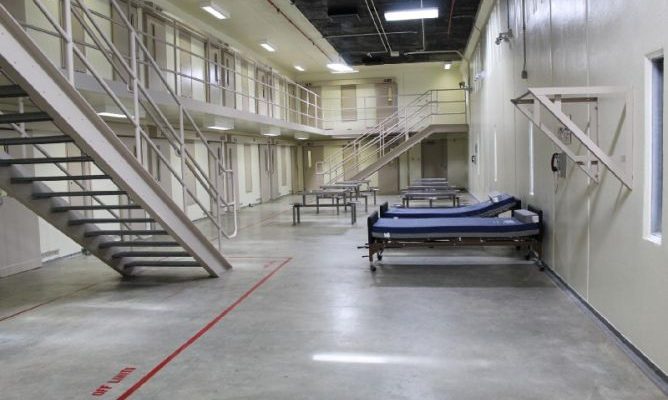The Delaware Department of Correction (DOC) announced late Monday that 350 inmates who tested positive for COVID-19 in July have already recovered, including 330 inmates from Sussex Correctional Institution (SCI). All 20 inmates have also recovered from a cluster of cases at Morris Community Corrections Center (MCCC) that originated with three SCI inmates who were transferred to the facility to serve their Level IV sentence after completing their term of Level V incarceration. The vast majority of these inmates were diagnosed through proactive testing and daily symptom checks of all SCI and MCCC inmates initiated by the DOC after a small number of inmates tested positive for the illness early last month.
Most COVID-positive inmates from SCI and MCCC remained free of symptoms after their test results were returned. Each recovered inmate is receiving follow-up COVID-19 testing and must receive two consecutive negative test results before returning to the general inmate population.
“The Department of Correction is in the healthcare business,” Commissioner Claire DeMatteis said. “Over the past month our aggressive action to identify, isolate, test, and treat inmates effectively stopped the transmission of COVID-19 in our facilities. As a result, 350 inmates have recovered, and today just 10 inmates who have the illness are displaying any symptoms as they continue to receive excellent care on their road to recovery.”
The latest recoveries come as the DOC this week deploys three dozen virtual education stations to inmate housing units across its four prison facilities, on top of the two dozen stations already deployed this spring to facilitate distance education for inmates during the COVID-19 pandemic. These specially-designed education stations contain video equipment, cameras, and hardware that allows the DOC to expand interactive group video education, treatment, and programming to dozens of new locations. Traditionally, group inmate education, programming, and other activities are provided in centralized classrooms that are shared by inmates across a prison facility; during the ongoing COVID-19 response shared access to common spaces has been restricted as the DOC takes aggressive steps to stop the potential spread of the illness. By upgrading its network capabilities over the past several months and investing $100,000 in virtual education stations, the DOC is taking programs directly to housing units where inmates can learn and receive group treatment in a safe environment with reduced risk of transmission.
The inmate populations that were served immediately by DOC’s implementation of virtual programming includes the Youthful Criminal Offenders Program (YCOP) at the Howard R. Young Correctional Institution. The DOC transitioned YCOP education and counseling programming to distance learning earlier this spring with no gap in services for these individuals.
“As we continue to mitigate the risk of COVID-19 in our correctional system we are leveraging technology in new ways to connect inmates to education and programming that supports their rehabilitation and reentry goals,” Commissioner DeMatteis said.
Except for the remaining COVID-positive inmates at SCI and one isolated case of a work release participant at Plummer Community Corrections Center (PCCC), there are no COVID-19 cases among inmates at the remaining seven DOC Level IV and Level V facilities. Click HERE to review a current tracking chart of active inmate and staff COVID-19 cases and recoveries. The PCCC work release participant was identified through DOC’s proactive weekly testing of all work release participants statewide, and no other work release participants have tested positive to-date. Work release continues in a limited capacity with rigorous safeguards in place, including isolation from other offenders at all times, twice-daily symptom checks, employer monitoring, and weekly proactive COVID-19 testing.
DOC continues its comprehensive COVID-19 mitigation efforts at SCI and MCCC, including:
Daily temperature checks, screenings for symptoms, and pulse oxygen level testing for inmates.
In-person visitation to all DOC facilities was suspended as a precaution.
Temporary suspension of programming in an effort to restrict movement across the facility. Inmates are continuing to be provided recreation time, including in outside recreation areas.
Voluntary COVID-19 testing is being offered to officers and medical personnel at multiple DOC facilities.
Additional deep cleanings are being conducted, including decontamination of housing units with specialized fogging machines.
SCI stopped accepting new commits on a temporary basis.
The DOC continues to employ a variety of prevention, screening, cleaning and containment measures to guard against the spread of the novel coronavirus, including:
All persons, including Officers, administrative staff and probationers who enter any Level V prison, Level IV violation of probation or work release center, or Probation and Parole Office are screened for COVID-19, including a series of questions and a forehead temperature check with a thermometer
Staff who present with symptoms are sent home to self-quarantine and directed to contact their health care provider.
Newly arriving inmates are held in isolation for the first 14 days, during which they are carefully monitored, including daily temperature checks with a thermometer.
DOC has implemented extra daily cleaning of DOC facilities and is using specialized fogging machines to disinfect entire rooms of common areas, housing units and workspaces.
Face masks are being worn by Correctional Officers and contract healthcare workers as a protection for inmates, Officers and other employees. All Correctional Officers have been wearing face masks since April 10.
Face masks have been provided to every inmate at all Level V prison and Level IV work release and violation of probation facilities statewide, more than 4,300 in total.
Certain programs, including treatment and education programs and religious programming, have been transitioned to a virtual video format. DOC has sped up implementation of new virtual video transmission capabilities across Level IV and Level V facilities to enable expanded medical and behavioral health telemedicine and inmate programming.
Inmates across Delaware’s correctional system continue to have outside recreation opportunities within their confined areas and continue to have access to phones to stay in regular contact with their loved ones. DOC is also expanding the use of electronic tablets among the inmate population, where available.
Source: DOC

